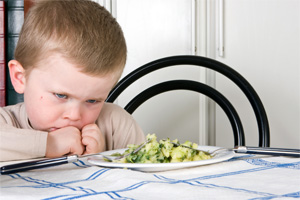While chatting with patients recently about their families’ meal schedules and eating habits, I noticed a disturbing pattern that’s worth writing about. It has to do with kids and the way we’re teaching them to approach food. Whether we call it “grab-and-go” or “fast food at home”, there are clear signs that our children are adopting the same bad habits as their time-pressed parents.
The story usually sounds something like this: “When my seven-year-old son comes home from school, he just helps himself to a snack from the refrigerator or cupboard. Sure-it’s almost always something that came from a box or was shrink-wrapped in plastic, but he gets something he likes and it’s easy…” 
The first problem is that most of the items available to kids in this kind of scenario are snacks. Either that or they’re processed food alternatives like Oscar Meyer “Lunchables,” which consists of refined white flour, sugar, highly-processed meat and partially hydrogenated oils. It’s also common for a product like this to contain a kid’s entire daily recommended allowance of sodium as well as a long list of difficult-to-pronounce chemical ingredients.
The second problem is that this food is so easily accessible in quantity. It’s just there for the taking…
The situation I’m describing is very common. Adults in most households have very demanding schedules, and few of them are fond of cooking. However, with childhood obesity at record levels and the rates of diabetes and heart disease skyrocketing, it’s important that kids start out on the right foot in terms of nutrition. After all, this is the time in their lives when they begin to develop a sense of what is and isn’t healthy to eat. It’s also where a lifetime of eating habits start.
Part of the challenge is that many parents themselves never learned how to cook. Many were raised in the era of the TV dinner. Their own parents (today’s grandparents) were often tired from work and nothing was easier than popping a tray in the oven and having dinner ready 20 minutes later. While that’s fine once in a while, most healthy nutrients come from cooking whole, unprocessed foods. And it doesn’t have to be difficult. Home economics has been phased out in most schools, which is unfortunate, as it taught both boys and girls the essentials of how to cook and eat well.
Children who take part in planning and cooking a meal are more invested in sampling the outcome, and it’s a great way to introduce your kids to new foods that they otherwise may not try. If they cooked it themselves, they are far more likely to eat it. Be sure to include a wide range of colorful vegetables so they learn to enjoy more than just potatoes and plain pasta.
One simple recipe that’s nutritious and easy for kids is pasta with tomato sauce. It’s as easy as using a couple of cans of plain tomato puree from the supermarket as a base for the sauce and building from there. Just sauté a little chopped onion in olive oil in a medium saucepan, then add some ground beef and stir until browned. Add the two cans of tomato puree, some dried basil and oregano or herbs de Provence, a sprinkling of salt and pepper, and voila! Now you have healthy (and tasty) pasta sauce.
If you want to add a little more color and nutrition, add some chopped red, yellow and green peppers to the sauce after sautéing the onions (red peppers have a higher vitamin C content than oranges). Let your kids choose the kind of pasta to use. The fusilli spirals and bowtie pasta are big favorites!
Teaching your kids to cook is a not only great way of spending quality time with them, but it will teach them useful skills that will get them started on the path to healthy eating. Besides, while you may learn one or two new cooking techniques as well while you’re at it!
